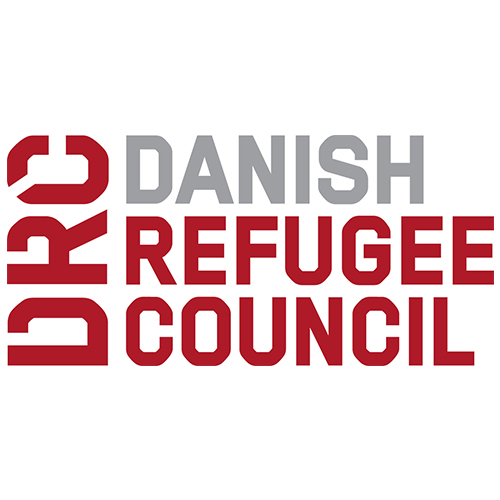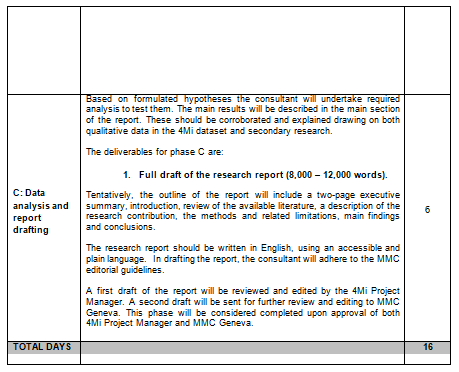(Offre en anglais) Danish Refugee Council lance un appel à consultation pour “Research on the determinants of detention in Libya” عودة إلى الفرص
Danish Refugee Council
يطلق Appel à candidaturesانتهاء الصلاحية
22 جويلية 2019 Il y a 7 ans
شروط الترشّح
أنقر هنا للاطّلاع على شروط الترشّحشارك الفرصة على
تفاصيل الفرصة
INTRODUCTION
The MMC is a leading source for independent and high-quality data, research, analysis and expertise on mixed migration. The MMC aims to increase understanding of mixed migration, to positively impact global and regional migration policies, to inform evidence-based protection responses for people on the move and to stimulate forward thinking in public and policy debates on mixed migration. The MMC’s overarching focus is on human rights and protection for all people on the move. The MMC focuses on 6 core regions, with regional teams in each of these: Eastern Africa & Yemen; North Africa; West Africa; the Middle East, Asia and Europe. Read more about the MMC here: www.mixedmigration.org. The MMC is part of the Danish Refugee Council (DRC), a leading humanitarian organization responding to displacement and mixed migration in 40 countries.
Since 2014, MMC has been implementing the Mixed Migration Monitoring Mechanism initiative (4Mi), a growing network of monitors stationed in key migration hubs in more than 20 countries along 7 major migration routes, who are interviewing refugees and migrants on the move on a continuous basis, providing a solid evidence base on the needs and protection incidents facing people on the move. Read more about 4Mi here: http://www.mixedmigration.org/4mi/.
BACKGROUND
Libya is an important destination and transit point for people on the move. Each year tens of thousands of people arrive to Libya, in the hope of finding a safer or brighter future.
An increasing number of reports has focused on documenting the conditions, human rights violations and abuses within Libya’s detention centres. These reports describe conditions of massive overcrowding, dire sanitary conditions and inadequate medical care. Furthermore, widespread abuses are documented including torture, beatings, burning with cigarette butts and electric shocks amongst others.
Although much has been discussed on the potential harmful effects of the current detention system in Libya, little is known about arrest and detention patterns and which profiles are more vulnerable to being detained. At first instance, both 4Mi and IOM-DTM data shows that a significant majority of detainees in Libya are from Eastern African nationalities. An account from Amnesty International also reports that Christians in Libya face specific vulnerabilities and are often subjected to abuses and ill-treatment including inside detention centres. However, an analysis on socio-demographic determinants of detention in Libya has not been conducted so far.
PURPOSE OF THE CONSULTANCY
The Mixed Migration Centre in North Africa is seeking a highly qualified consultant to conduct research on the determinants of detention of refugee and migrants in Libya.
Under the direct supervision of the 4Mi Project Manager, the purpose of the consultancy is to produce a research report exploring what makes people on the move more likely to end up in detention in Libya.
The report aims at looking into more detail at the socio-demographic profile of detainees including nationality, ethnicity and religion. The objective is to analyze 4Mi data in order to determine the likelihood of specific profiles being detained in Libya and explore related reasons.
DELIVERABLES
TIMELINE AND PAYMENT
The duration of the assignment is estimated to 16 working days, payable as per below schedule:
This is a home-based consultancy and no travel is foreseen. There are no other entitlements or benefit attached to this contract.
GENERAL
Commitments: DRC has a Humanitarian Accountability Framework, outlining its global accountability commitments. All staff are required to contribute to the achievement of this framework (http://www.drc.dk/HAF.4265.0.html)
شروط الترشّح
- Advanced degree (Master or PhD) in quantitative research methods, preferably applied to migration studies or social sciences.
- Proven experience in designing and leading research on migration, detention and similar relevant topics.
- Excellent command of quantitative research methods and related software applications (preferably STATA).
- A proven knowledge and understanding (e.g. through prior publications) of mixed migration dynamics in North Africa.
- Familiarity with the Libyan context.
- Excellent analytical and reporting skills.
- Excellent command of spoken and written English
- Previous experience with 4Mi methodology and data ( Desirable )
- Previous experience with MMC or DRC (Desirable )
- Knowledge of detention system in Libya (Desirable)
انتهت صلوحية الفرصة
للأسف هذه الفرصة لم تعد موجودة على جمعيتي . زوروا بانتظام قسم الفرص لتجنب افلات الفرص اللاحقة
للاتصال
تابع "جمعيتي" على لينكد إن
احصلوا على جمعيتي موبايل من الآن

دعوة للترشّح منشور على "جمعيتي" في 12 juillet 2019
إكتشف المزيد من الفرص على "جمعيتي" عبر النّقر على هذا الرّابط.




